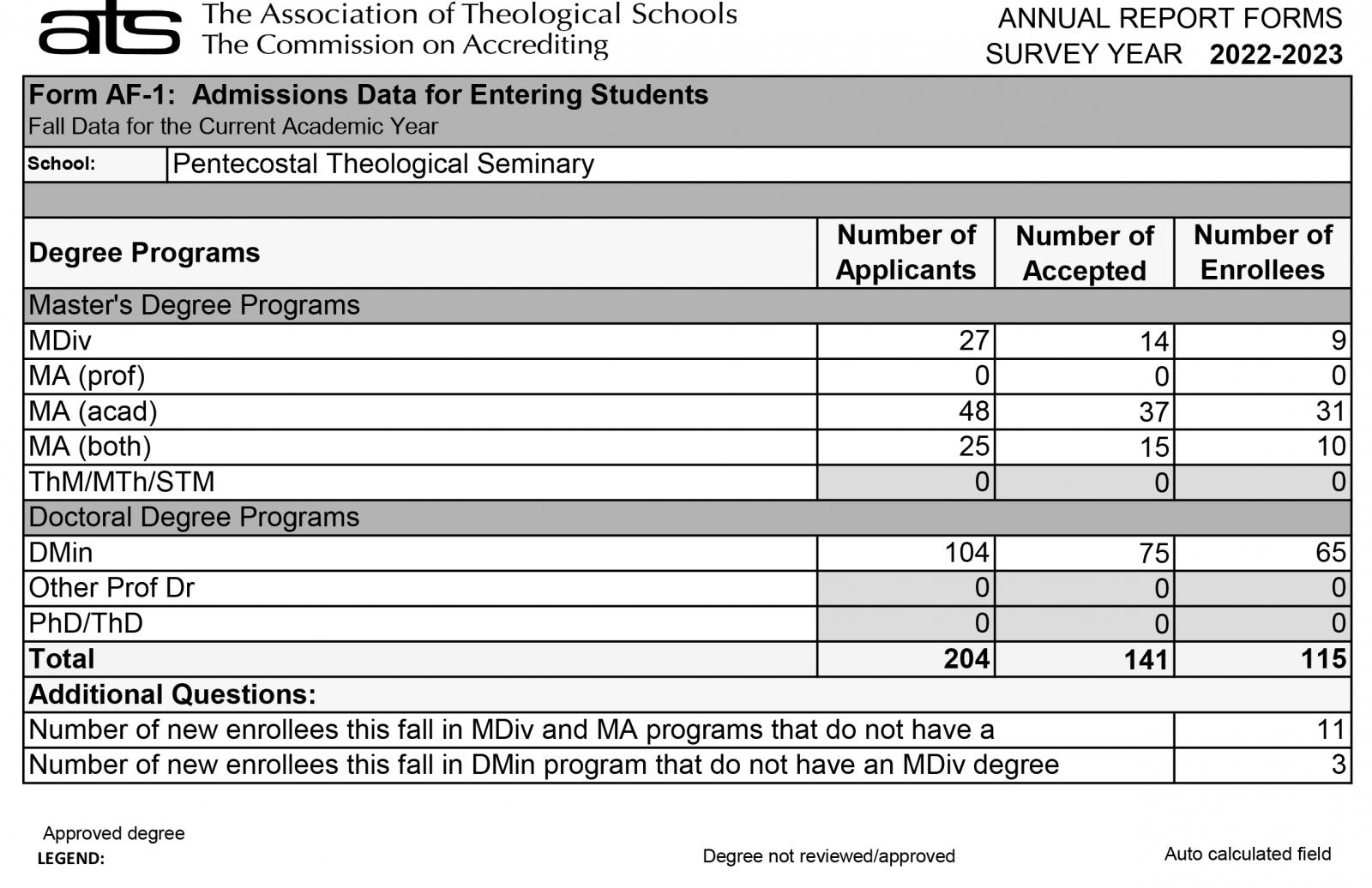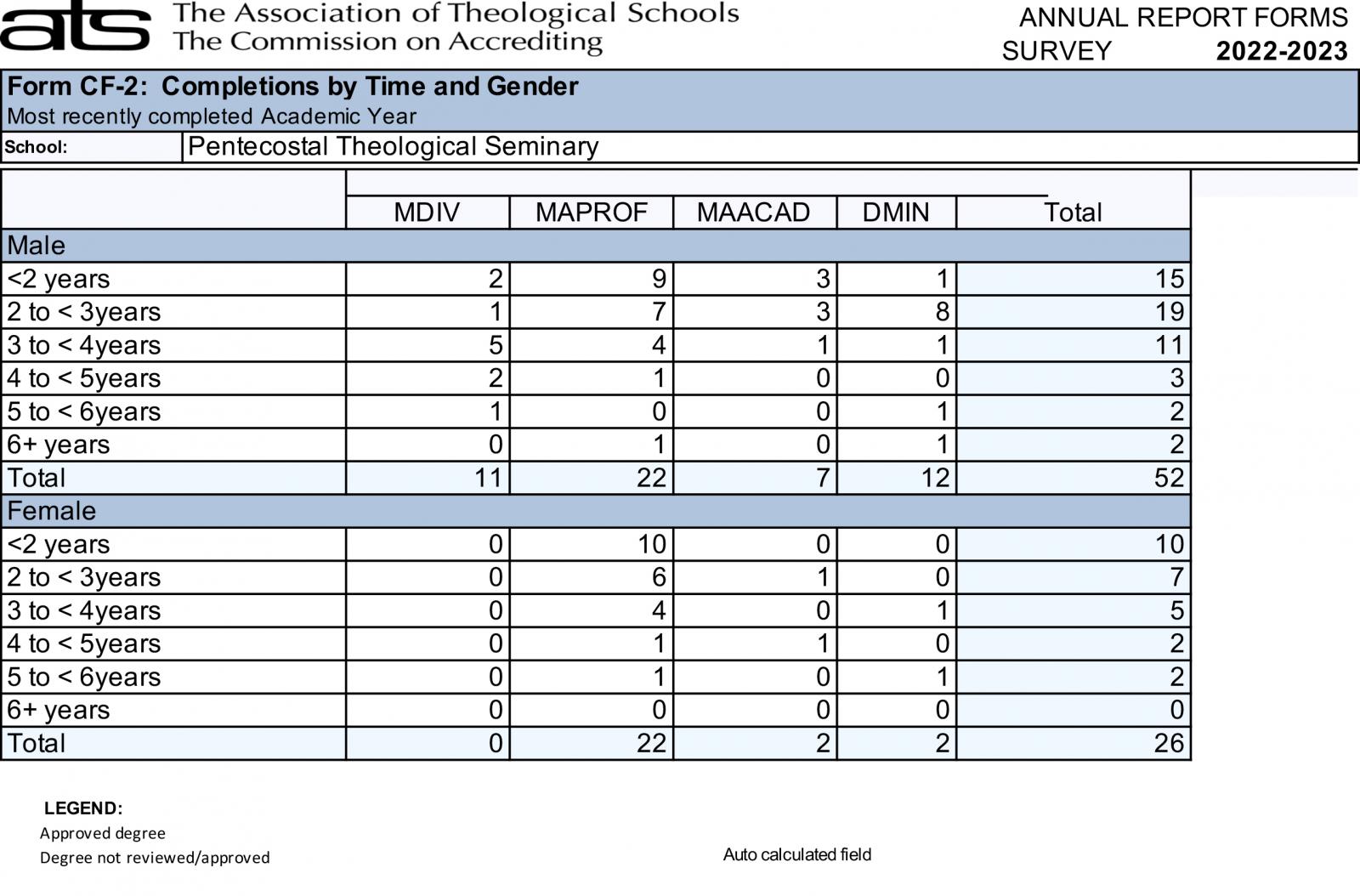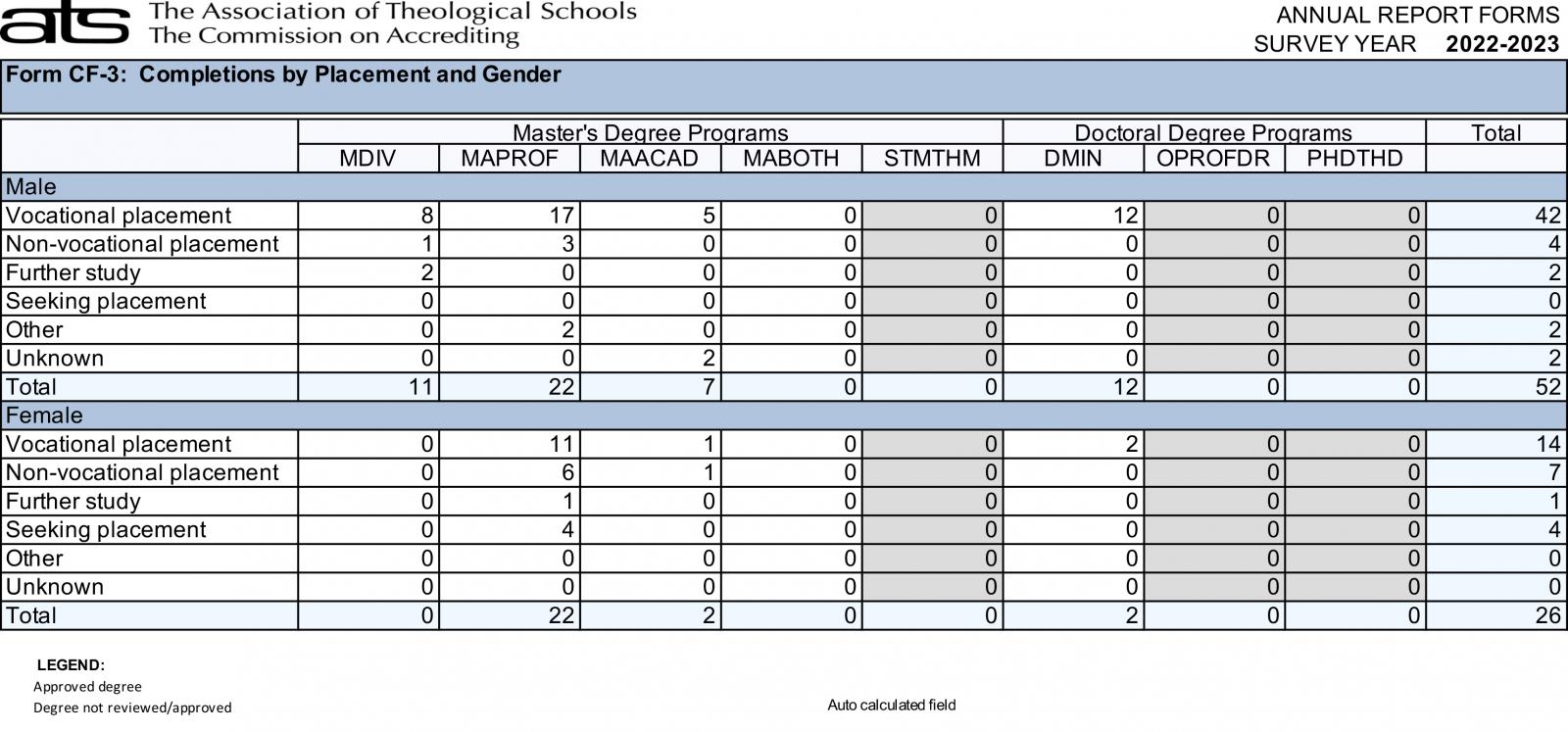Statement of Student Achievement and Educational Effectiveness
Goals for Student Achievement and Educational Effectiveness
The Goals for Student Achievement and Educational Effectiveness for the Pentecostal Theological Seminary (PTS) are aligned with the Institutional Mission and Outcomes of the Seminary. The Seminary Goals for Student Achievement and Educational Effectiveness are as follows. Students will be:
- Supported and resourced for Holy Spirit-filled and Holy Spirit led Christian ministry in today’s world
- Act in obedience to God under the Lordship of Jesus Christ in the power of the Spirit
- Be committed to the absolute authority of Scripture and to the Holiness-Pentecostal interpretation of the Christian Faith as set forth in the Declaration of Faith of the Church of God
- Pursue a community of faith, worship and study, nurturing covenantal relationships and creating awareness of the world mission and global diversity of the Church
- Be helped to integrate life and learning in such a way that they may acquire the maturity and professional competency needed to carry out the mission of the Church in the world
- Be committed to the spiritual, doctrinal, and ethical emphases of the Church
- Be committed to serving and training the ministry of the Church
Key Student Achievement Indicators
The achievement of these Goals of Student Achievement and Educational Effectiveness are demonstrated in part by the following Key Student Achievement Indicators:
Graduation Rates (based on PTS Registrar Data)
- Placements (based on ATS Report Data)
- Ministerial License achievement for those seeking Ministerial License (based on denominational licensure data, primarily Church of God) for MDiv, MACM, DWPM
- Professional Credentials achievement for those seeking licensure (Licensed Professional Counselor rates for MACMHC
- Graduate self-report on the Graduate Student Questionnaire (based on ATS Exit Questionnaire)
- Alumni Data (based on PTS Alumni Survey)
- Summative Capstone Data at end of Academic
2023 Graduate Assessment Results
The 2023 Graduate Assessment was emailed in May 2023 to 102 graduates who completed one of the masters programs or the DMin program.
Select link to view the 2023 Graduate Assessment
2024 Graduate Assessment Results
The 2024 Graduate Assessment was emailed in May 2024 to graduates who completed one of the masters programs or the DMin program.
Select link to view the 2024 Graduate Assessment
2018 PTS Alumni Assessment
This assessment was emailed (April 4 – April 12, 2018) to 464 graduates of Pentecostal Theological Seminary from 2008-2017. It includes answers from 125 respondents representing a response rate of 26.9%. Scores are based on a linear scale of 1-10, with 10 being the highest score.
|
Question
|
Mean Score
|
|
Biblical Studies courses at PTS aided in the acquisition of skills necessary to interpret and understand the Scriptures.
|
9.3
|
|
Biblical Studies courses at PTS emphasized that integrity grows out of Biblical roots and is manifested in spiritually fruitful, interpersonal relationships.
|
9.31
|
|
Biblical Studies courses at PTS encouraged sensitivity to the Holy Spirit in all areas of life and ministry, especially in anointed preaching and teaching of the Word.
|
9.43
|
|
Theological studies courses at PTS taught the faith and history of the Church, especially the deep Scriptural holiness and themes which have figured prominently in the Pentecostal Movement.
|
9.35
|
|
Theological studies courses at PTS promote a historically informed appreciation of the doctrines and ministries of the Church in today’s world.
|
9.17
|
|
Theological studies courses at PTS provide a theological foundation for a ministry of servant leadership and a commitment to a global, multicultural Church with a mission to all peoples.
|
9.22
|
|
Theological studies courses at PTS inculcate a sense of the relationship between doctrine, spiritual formation and ministry practice.
|
9.3
|
|
Pastoral and leadership studies at PTS facilitate the development of a theology and practice of ministry which is biblically sound, historically informed, and relevant to contemporary human needs.
|
9.3
|
|
Pastoral and leadership studies at PTS impart a comprehensive and integrated vision of the human condition in order to enable one to minister to the whole person in his or her socio-cultural setting.
|
9.09
|
|
Personal Formation for Ministry studies at PTS cultivate the development of a personal identity in Christ which integrates one’s personal story with that of the people of God and the mission of the Church.
|
9.26
|
|
Personal Formation for Ministry studies at PTS nurture commitment to lifelong discipleship characterized by unity within the body of Christ, stewardship in a local congregation, worship, and spiritual disciplines.
|
9.15
|
|
Personal Formation for Ministry studies at PTS provide a community of faith and fellowship that enriches the student’s life and family for ministry in the Church.
|
9.02
|
|
My degree program increased my competence in the practices of ministry / vocation.
|
9.56
|
|
My degree program added economic value to my ministry/vocation (Did your studies empower your earning potential?)
|
7.33
|
|
GAINFUL EMPLOYMENT BY DEGREE PROGRAM
|
|
|
DMIN
|
MDIV
|
MTS
|
MAC
|
MACMHC
|
MACM
|
|
Percentage of respondents who are serving (employed or volunteer) in a ministry related position that corresponds to their degree program?
|
76%
|
85.7%
|
100%
|
76.5%
|
83.3%
|
100%
|
|
Mean score of respondents who indicated that their degree program increased competence in the practices of ministry/vocation.
|
9.44
|
9.39
|
9.83
|
9.62
|
9.67
|
9.54
|
|
Mean score of respondents who indicated that their degree added economic value to ministry/vocation.
|
7.12
|
7.03
|
9.0
|
8.92
|
8.67
|
5.73
|



Professional Credentials: Counseling Licensure Rates
Statement of Student Achievement Regarding the Master of Arts in Clinical Mental Health Counseling (MACMHC) and Licensed Professional Counselor (LPC) Status: As of 2022, 83% of those pursuing licensure have attained licensure or are still within the normal time limits required for obtaining licensure (2 years) after graduation. Only 13% have not obtained LPC within the two-year normal period for successfully obtaining licensure.
Graduate Self-Report
To ensure that its educational programs, academic services and student support services have their intended impact for the good of the Church and world, the Pentecostal Theological Seminary (PTS) engages in regular practices of assessing the effectiveness of its programs.
One of the ways we do this is to ask our graduating students how they think we did during their time with us. The instrument we use for this, the Association of Theological Schools (ATS) Graduating Student Questionnaire (GSQ), is used by 120-140 accredited seminaries of all types, sizes and denominations across the United States and Canada. It asks graduates to rate a wide variety of aspects of the education they received and their experience of the school using a scale from 1 (worst) to 5 (best).
Here you can find a selection of key scores for PTS’s academic programs and the comparison scores for all the seminaries that use the ATS GSQ (approximately 50% of accredited seminaries in the U.S. and Canada). We hope this helps you make your own assessment of the value of a PTS education.
|
Ratings of Satisfaction with Progress in Skills Related to Ministry 2014 M.Div. Graduates Scale: 1 = very dissatisfied 2 = dissatisfied 3 = neutral 4 = satisfied 5 = very satisfied
|
|
MINISTERIAL SKILL
|
GRADUATES of PTS
|
ALL SEMINARY GRADUATES
|
|
Ability to preach well
|
4.8
|
4.1
|
|
Ability to use and interpret Scripture
|
5.0
|
4.5
|
|
Knowledge of church polity
|
4.6
|
3.9
|
|
Ability to give spiritual direction
|
4.6
|
3.9
|
|
Ability to teach well
|
4.8
|
4.0
|
|
Knowledge of church doctrine and history
|
4.6
|
4.2
|
|
Ability to lead others
|
4.6
|
4.0
|
|
Ability to conduct worship/liturgy
|
4.0
|
4.0
|
|
Ability to interact with other religious traditions
|
4.8
|
4.0
|
|
Ability to work within my own religious tradition
|
4.8
|
4.1
|
|
Ability to relate social issues to faith
|
4.6
|
4.2
|
|
Ability in pastoral counseling
|
4.6
|
3.9
|
|
Ability to administer a parish
|
4.4
|
3.4
|
|
Knowledge of Christian philosophy and ethics
|
4.6
|
4.1
|
|
Ability to think theologically
|
4.8
|
4.5
|
|
Ratings of Personal Growth 2014 M.Div. GraduatesScale: 1 = much weaker 2 = weaker 3 = about the same 4 = stronger 5 = much stronger
|
|
MINISTERIAL SKILL
|
GRADUATES of PTS
|
ALL SEMINARY GRADUATES
|
|
Insight into troubles of others
|
4.2
|
4.0
|
|
Trust in God
|
4.8
|
4.1
|
|
Self-discipline and focus
|
4.7
|
4.0
|
|
Respect for other religious traditions
|
4.3
|
4.1
|
|
Respect for my own religious tradition
|
4.7
|
4.3
|
|
Ability to live one’s faith in daily life
|
4.8
|
4.0
|
|
Clarity of vocational goals
|
4.7
|
3.9
|
|
Self-confidence
|
4.5
|
4.0
|
|
Self-knowledge
|
4.5
|
4.2
|
|
Strength of spiritual life
|
4.5
|
3.9
|
|
Ratings of Overall Experience of the Educational Program All 2014 Graduates Scale: 1 = strongly disagree 2 = disagree 3 = neutral 4 = agree 5 = strongly agree
|
|
MINISTERIAL SKILL
|
GRADUATES of PTS
|
ALL SEMINARY GRADUATES
|
|
Field education/internship has been a helpful experience
|
4.1
|
3.9
|
|
Faculty were supportive and understanding
|
4.5
|
4.4
|
|
I have felt accepted within this school community
|
4.6
|
4.3
|
|
I have grown spiritually
|
4.9
|
4.4
|
|
My personal faith has been respected
|
4.9
|
4.4
|
|
I know at least one faculty member well
|
4.8
|
4.3
|
|
I have been able to integrate theology and the practice of ministry
|
4.9
|
4.4
|
|
The school has tried to be an inclusive community
|
4.8
|
4.2
|
|
I have come to know students from other ethnic groups
|
4.9
|
4.3
|
|
I have made good friends here
|
5.0
|
4.3
|
|
Seminary was a good experience for my spouse/family
|
4.8
|
3.6
|
|
I have been able to manage financially
|
4.2
|
3.8
|
|
I have been satisfied with my academic experience here
|
4.9
|
4.4
|
|
If I had to do it over, I would still come here
|
5.0
|
4.4
|
Summative Capstone Data
The Summative Capstone Score is the summary score rating the students overall learning outcome for a course experience in which all they have learned in the program is demonstrated and assessed. The capstone varies according to academic program. The capstones for each academic program is as follows:

The criteria by which students learning is assessed is as follows:

The Diploma in Wesleyan-Pentecostal Ministry, Master of Arts in Christian Studies and Graduate Certificate in Advanced Clinical Behavioral Health are newer programs and do not have sufficient data for assessment.
2018 PTS Accreditation Assessment